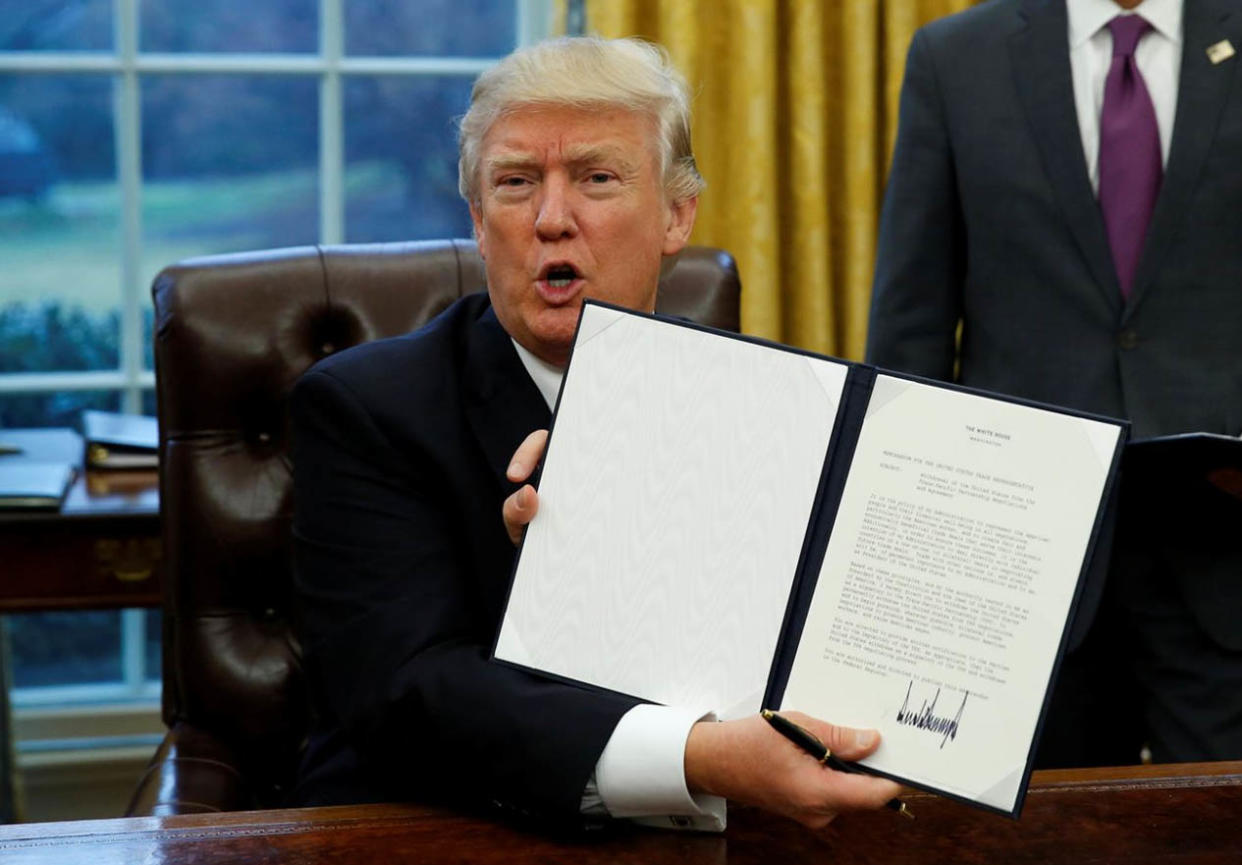Stories to watch: Trump’s split personality on trade

Donald Trump is in the White House, and Yahoo News is taking a look at the top stories to watch in his first 100 days. From the unusual role family members will play as White House advisers, to his promises to aggressively transform U.S. trade policy, and from investigations into Russian interference in the election to his relationship with Paul Ryan, we’ll be rolling out 15 stories over five days — signposts for the road ahead.
_____
THE STAKES
President Trump has vowed to remake the global economy so middle-class workers benefit more — and acted on that pledge right off the bat. So far, he has badgered U.S. manufacturers about producing more in the United States, threatened a 20 percent tax on everything imported from Mexico, and canceled America’s participation in the Trans-Pacific Partnership, a 12-nation trade deal.
Trump argues that cheap imports from Mexico, China and other low-cost countries have killed millions of American jobs, which he vows to “bring back.” How? By renegotiating trade deals and pressuring trading partners to buy more products made in the USA. If negotiations don’t produce the desired results, Trump says he’ll impose tariffs on imports to make those goods more expensive, which, in theory, would encourage American manufacturers to make more goods here at home.
____
THE STORY
Trump’s threats on trade have unnerved many economists and business leaders, since most big U.S. companies rely heavily on the free flow of goods across borders. They worry that efforts to limit trade — especially the imposition of tariffs — would lead to escalating protectionism that hurts profitability, imperils jobs and might even cause a recession. Tariffs on imports would also make those goods more expensive for American consumers, perhaps on a wide range of products — and inflation is often a precursor of recession.
Trump is already rattling his saber, through tweet-attacks on companies such as Ford, General Motors and Toyota, which build cars in Mexico, and through threats of tariffs, which he calls border taxes. The No. 1 thing to watch for is whether Trump informs Mexico and Canada that he intends to withdraw the U.S. from the North American Free Trade Agreement, the trade pact that has been in place since 1994. Any country can withdraw six months after giving notice, and once that happens, Trump can impose tariffs on imports from the two countries, with no need for congressional legislation. Financial markets would probably drop after such an action, one reason Trump may hold fire.
Trump might be able to renegotiate NAFTA and other trade deals without resorting to controversial tariffs. Even so, that doesn’t mean new jobs will materialize. Many experts say robots, automation and other types of technology have killed far more manufacturing jobs than cheap production in China or Mexico — and Trump has said little about that. If Trump ends up forcing U.S. manufacturers to hire more American workers than they really need, it could even hasten the adoption of new technology meant to replace workers and keep costs down.
____
THE PLAYERS
Trump’s trade team can be split into bad cops and good cops — and it’s far from certain who will prevail. The baddest cop of all is Trump himself, whose bellicose rhetoric on China and Mexico suggests he’s willing to risk all to get “better deals” for America. White House strategist Steve Bannon, the former Breitbart News executive, shares Trump’s view of an America snookered by China and Mexico and seems to be a hard-line protectionist. Economist Peter Navarro, a business professor at the University of California, Irvine, is a longtime China basher who heads a new White House council on trade. And Trump’s nominee for U.S. trade representative, Joe Lighthizer, is a China critic and lawyer who has represented U.S. manufacturers accusing China of illegally dumping products onto the U.S. market at artificially low prices.
But other Trump aides are free-marketeers, more supportive of open borders and less likely to break the china. The good cops include Trump’s nominee for commerce secretary, private-equity billionaire Wilbur Ross, whom Trump has anointed his point man on trade. Steve Mnuchin, Trump’s treasury nominee, is a Wall Street veteran and by all appearances a true-blue establishmentarian. And Trump has nominated Iowa Gov. Terry Branstad as his ambassador to China, tapping a farm-state politician who intimately understands how important open borders and agricultural exports are to the U.S. farm economy.
If Trump’s strategy on trade is coherent, it might make sense for the bad cops to threaten China and Mexico with harmful sanctions while the good cops quietly negotiate more moderate adjustments. That would allow Trump to look tough while giving him victories to claim without causing too much economic damage. But it’s also possible the two factions will clash, with Trump’s trade efforts dominated by infighting. If that happens, watch for early resignations as a sign of which side is gaining the upper hand.
Read more from Yahoo News:



